
"One Love" is a song by British electronic music act the Prodigy, released on 4 October 1993 by XL Recordings as the first single from the act's second album, Music for the Jilted Generation (1994). The song peaked at number eight on the UK Singles Chart and number five on the UK Dance Singles Chart. It was also a top 30 hit in Sweden and Switzerland.

"Move (You Make Me Feel So Good)" is a song by American electronic musician Moby, with a chorus sampling from Loleatta Holloway's 1980 song "Love Sensation". It was first released as the title track on Moby's extended play Move, which was issued on August 31, 1993, as his first release on Mute Records in the United Kingdom and on Elektra Records in the United States. It hit number one on the US Billboard Hot Dance Music/Club Play chart and number 21 on the UK Singles Chart.

"Two Can Play That Game" is a song by American R&B singer-songwriter Bobby Brown from his third album, Bobby (1992). The single release was remixed by K-Klass and originally reached No. 38 on the UK Singles Chart in June 1994. In April 1995, it re-entered the chart, peaking at No. 3. It received positive reviews from music critics and also reached No. 3 in the Netherlands. Additionally, it became a top-20 hit in Belgium, Denmark, Finland, Ireland, and Italy. On the Eurochart Hot 100, "Two Can Play That Game" peaked at No. 10. This version of the song appeared on Brown's remix album of the same name, released later in 1995.

"The Love I Lost" is a song by American R&B group Harold Melvin & the Blue Notes. Group member Teddy Pendergrass sang lead vocals. Originally written as a ballad by Philly soul songwriters Kenny Gamble and Leon Huff, the song was transformed into a funk song and features drummer Earl Young. It was released from the Black & Blue album in late 1973 and sold more than a million copies. In the 21st century, the track has been the subject of extended re-edits by notable remixers Tom Moulton, Theo Parrish, and Dimitri From Paris.

"Turn On, Tune In, Cop Out" is a song by Norman Cook's acid jazz group Freak Power, released in October 1993 by Island Records and 4th & Broadway as the debut single from their first album, Drive-Thru Booty (1994). The song features a smooth jazz sound and the baritone vocals of lead singer Ashley Slater. The single originally charted at number 29 in the United Kingdom. However, two years later, the song was used in the popular Levi's advertisement "Taxi", and it was re-released on 6 March 1995. This time, the single was a success, reaching number three on the UK Singles Chart and becoming the group's only top-20 hit. The song was also a moderate hit in western Europe and New Zealand.

"Feels Like Heaven" is a song by British dance music band Urban Cookie Collective, released on 1 November 1993 by Pulse 8 as the second single from their debut album, High on a Happy Vibe (1994). As the follow-up to "The Key the Secret", it was both written and produced by Rohan Heath, and peaked at number five on the UK Singles Chart, staying in the chart for nine consecutive weeks. The vocals were by Diane Charlemagne, who had provided the vocal for the band's previous hit and their subsequent singles. Its accompanying music video was directed by British director Lindy Heymann, featuring the band performing on the beach.
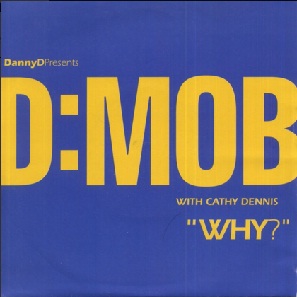
"Why" is a song by British music producer and remixer D Mob featuring singer-songwriter Cathy Dennis. It was released by FFRR as the fourth single from Dennis's second album, Into the Skyline (1992), a full year after her previous single from the album. In the UK, it reached number 23 on the UK Singles Chart, number seven on the UK Dance Singles Chart and number one on the UK Club Chart, making it the most successful single from the album. "Why" was dedicated in memory of Philip Hall, who died in December 1993.
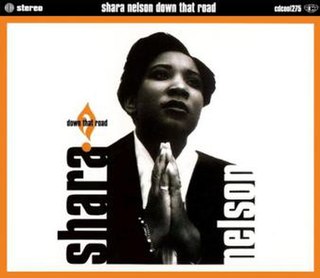
"Down That Road" is a song by British singer-songwriter Shara Nelson, released July 1993 on Cooltempo Records as the debut single from her first solo album, What Silence Knows (1993). The song was written by Nelson with Attrell Cordes and produced by Michael Peden. It peaked at number 19 on the UK Singles Chart, as well as number one on the European Dance Radio Chart by Music & Media, and also became a top-20 hit on the US Billboard Hot Dance Club Play chart. The accompanying music video sees the singer performing the song on a beach.

"Inside Out" is a song by British singer and songwriter Shara Nelson, released in November 1993 on Cooltempo Records as the third single from her first solo album, What Silence Knows (1993). In August 1994, it was re-released as part of a remix single with "Down That Road". The song, which was co-written by Nelson, peaked at number 34 on the UK Singles Chart and number ten on the UK Dance Singles Chart. A music video was also produced to promote the single.

"Heaven Knows" is a song by American singer-songwriter Luther Vandross, released in September 1993 by Epic and Sony as the second single from his eight studio album, Never Let Me Go (1993). The song was written by Vandross with Reed Vertelney and produced by Marcus Miller. It peaked in the top 30 on both the US Billboard Hot R&B Singles and Hot Dance Club Play charts, and also at thirty-three on the Billboard Hot Adult Contemporary Singles chart. "Heaven Knows" was nominated for Best R&B Song alongside "Little Miracles " at the 36th Annual Grammy Awards in March 1994, losing to "That's the Way Love Goes" by Janet Jackson.

"Born 2 B.R.E.E.D." is a song by British rapper, actress and radio personality Monie Love. It was written by Love with Prince and Levi Seacer Jr., and released in February 1993 by Chrysalis Records as the second single from her second album, In a Word or 2 (1993). B.R.E.E.D. is an acronym for "Build Relationships where Education and Enlightenment Dominate". A remix produced by Steve "Silk" Hurley was also included on the album. In Love's native UK, the single went to number 18, as well as charting on the Dutch and German music charts. In the US, "Born 2 B.R.E.E.D." was Monie Love's most successful of four releases on the dance chart, reaching number one on the Billboard Dance Music/Club Play Singles chart for one week. It also peaked at number 56 on the Billboard soul chart and number 89 on the Billboard Hot 100. In Australia, the song peaked at number 98 on the ARIA singles chart in May 1993.

"Son of a Gun" is the debut single of British dance music DJ Jake Williams, released under the name JX. It was released in March 1994, reaching number six in the United Kingdom and Australia and number 35 in the Netherlands. The song contains samples from the 1976 song "Touch and Go" by Ecstasy, Passion & Pain featuring Barbara Roy. Two different music videos were made to promote the single. The Top Ten chart success of "Son Of A Gun" in Australia was very much, almost solely, due to a community radio station in Melbourne, 98.9 North West FM. The station instantly identified the hit quality of the song and immediately added the song to the station's playlist on high rotation, and also incorporated grabs of the song in station IDs, "cue to call" promotions and other program elements. This almost saturation exposure of the song not only brought the song to the attention of the station's listeners, but also forced the hand of other Melbourne radio stations to add the song to their own playlists, some taking a full three months after North West FM's debut.

"Carry On" is a song by American singer Martha Wash, released on October 30, 1992 through RCA Records as the lead single from her debut solo self-titled studio album, Martha Wash (1993). It was written by Eric Beall, who also composed the instrumentation in collaboration with Steve Skinner and peaked at number-one on the US Billboard Hot Dance Club Play chart.
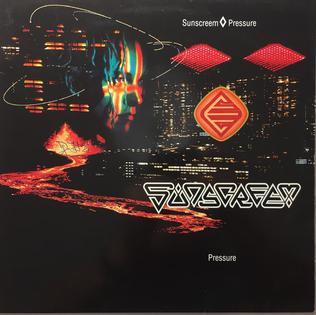
"Pressure" is a song recorded by British techno group Sunscreem, written and produced by band member Paul Carnell and lead singer Lucia Holm for the act's debut album, O3 (1993). Released in 1991 by Sony Soho Square/Epic, it was the group's first single in the United Kingdom, where it peaked at number 60. It became a major club hit in the United States in wake of the success of "Love U More", where it was released as "Pressure US" with a new remixed version and went to number one on the US Billboard Hot Dance Club Play chart for one week in June 1993, their second of three number ones. The re-released version reentered the UK charts afterwards, peaking at number 19 in 1993.

"Rockin' for Myself" is a song by British electronic dance music record producer Motiv8, aka Steve Rodway. Based around a vocal loop originally performed by Anne-Marie Smith on Italian dance act 49ers' 1992 single, "Move Your Feet", it was released in late 1993 and features vocals by British singer Angie Brown. This version reached number 67 on the UK Singles Chart. In the spring of 1994, it was re-mixed and re-released, peaking at number 18 in the UK. But on the UK Dance Singles Chart, it was even more successful, peaking at number-one. On the Eurochart Hot 100, it reached number 63. Outside Europe, it was successful in Australia, peaking at number nine. A music video was produced to promote the single, featuring a model and dancer lip-syncing the song on a red sofa, wearing yellow sweater and beret.

"Unforgiven" is a song by Northern Irish musical group D:Ream, released in July 1993 by labels Magnet and FXU as the third single from their debut album, D:Ream On Volume 1 (1993). Written by band members Peter Cunnah and Al MacKenzie, it was produced by the group with Tom Frederikse. It peaked at number 29 in the UK and number ten in Portugal. After the success of the singles "U R the Best Thing" and "Things Can Only Get Better", "Unforgiven" was re-released in 1994. A music video was also produced to promote the single.
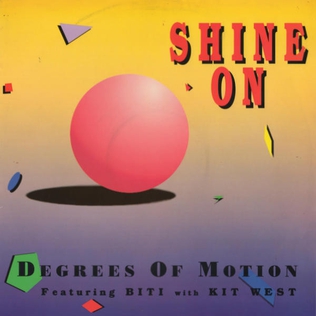
"Shine On" is a song by American house music project Degrees of Motion, featuring vocals by Biti Strauchn and Kit West. It was originally released in July 1992 as a single from their album, Degrees Of Motion (1991), peaking at number 43 on the UK Singles Chart. Following a re-release in March 1994, it charted higher, peaking at number eight on the same listing. It also reached number one on the UK Dance Singles Chart same year.
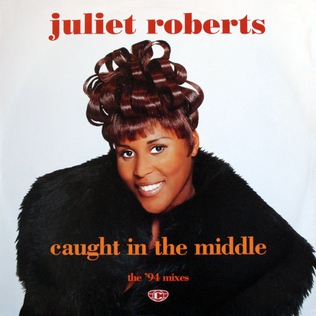
"Caught in the Middle" is a song by British singer-songwriter Juliet Roberts, originally released in July 1993 by Cooltempo Records and Slam Jam. In June 1994, the song was re-released as a remix and became a club hit. Written by Roberts with Danny Poku, who also produced the song, it was well received among music critics, reaching number-one on both the US Billboard Hot Dance Club Play chart and the UK Music Week Dance Singles chart, where it peaked atop both in 1993 and 1994. Additionally, the single peaked at number 14 in the UK, and number 31 in Scotland, while on the Eurochart Hot 100, it reached number 43. "Caught in the Middle" was included on her debut album, Natural Thing (1994), and it won the Record Mirror Club Cut of the Year honour at the 1994 Music Week Awards.

"I Want You" is a song by English singer-songwriter Juliet Roberts, released in March 1994 by Cooltempo as the second single from the singer's debut album, Natural Thing (1994). Originally released as a double A-side with her song "Again", it was then released as its own single following the success of its predecessor, "Caught in the Middle", in 1994. Co-written by Roberts with Nathaniel Pierre Jones, it was produced by Dancin' Danny D and peaked at number one on the US Billboard Hot Dance Club Play chart. The song also reached number 44 on the Billboard Hot 100. In Europe, it charted in the UK, where it peaked at number 28 on the UK Singles Chart, but was more successful on the UK Dance Singles Chart, reaching number three in October 1994. The accompanying music video for the song was directed by American filmmaker and comic artist Antoine Fuqua.

"Let the Music (Lift You Up)" is a song by British house music group Loveland featuring singer Rachel McFarlane, released in 1994 as their debut single. It is a cover of a song by American singer Darlene Lewis and some of the single releases also featured both versions. The Loveland version was included on their only album, The Wonder of Love (1995), and peaked at number 16 on the UK Singles Chart. It also reached number-one on both the UK Dance Singles Chart and the UK Club Chart, and won the Best Dance Record of the Year award at the Silver Clef Award.




















